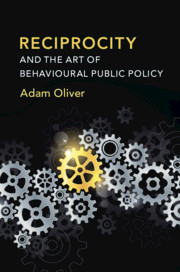Book contents
- Reciprocity and the Art of Behavioural Public Policy
- Reciprocity and the Art of Behavioural Public Policy
- Copyright page
- About the author
- Dedication
- Contents
- Figures and Tables
- Preface
- Acknowledgements
- 1 Setting the Scene
- 2 Animals and Infants
- 3 A Pinch of Anthropology
- 4 A Dash of Behavioural Economics
- 5 The Domain of Reciprocity
- 6 The Dark Side of Reciprocity
- 7 Nurturing Reciprocity in Public Policy
- 8 Reciprocity-Informed Policy Design
- 9 Towards a Political Economy of Behavioural Public Policy
- 10 Summing Up
- References
- Index
4 - A Dash of Behavioural Economics
Published online by Cambridge University Press: 06 July 2019
- Reciprocity and the Art of Behavioural Public Policy
- Reciprocity and the Art of Behavioural Public Policy
- Copyright page
- About the author
- Dedication
- Contents
- Figures and Tables
- Preface
- Acknowledgements
- 1 Setting the Scene
- 2 Animals and Infants
- 3 A Pinch of Anthropology
- 4 A Dash of Behavioural Economics
- 5 The Domain of Reciprocity
- 6 The Dark Side of Reciprocity
- 7 Nurturing Reciprocity in Public Policy
- 8 Reciprocity-Informed Policy Design
- 9 Towards a Political Economy of Behavioural Public Policy
- 10 Summing Up
- References
- Index
Summary
The study of reciprocity has attracted a lot of interest among behavioural economists, at the levels of both theoretical modelling and experimental testing. This chapter reviews briefly the main theories that have been proposed, and their consideration of intentions versus outcomes as drivers of reciprocity. However, most of the chapter reviews the economic games that behavioural economists have used to test reciprocal actions, including the ultimatum, dictator, centipede, trust and public goods games. These games demonstrate again that the extent to which reciprocity is observed and sustained is dependent heavily on context, with repetition of the game, the inclusion or not of the opportunity to punish, anonymity between partners, whether the money on offer is windfall or earned, and a host of other possible factors all having an influence. The evidence on the whole also supports the notion that while intentions certainly matter, for reciprocity to be sustained over an extended period, outcomes matter too.
- Type
- Chapter
- Information
- Reciprocity and the Art of Behavioural Public Policy , pp. 57 - 75Publisher: Cambridge University PressPrint publication year: 2019



